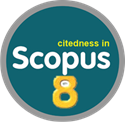The Influence of Pressure, Opportunity, Rationalization and Ethical Value on the Accounting Fraud Tendency
Abstract
The purpose of this study is to prove empirically the influence of pressure, opportunity, rationalization, and ethical value on the tendency of fraudulent accounting employees of accounting and finance companies operating in Surabaya. Pressure, opportunity, rationalization, and ethical values are measured by the Likert scale 1-5. The population used includes accounting and financial employees of companies that operate in Surabaya. Determination of sampling using purposive judgmental sampling method and obtained 74 respondents. This study's analysis technique uses a linear regression method with a confidence level of 5% by using SPSS 25.0. This study proves that the variables of pressure, opportunity, and rationalization have a significant positive effect on the accounting fraud tendency. In contrast, the ethical value variable has a significant negative impact on the preference for accounting fraud. The coefficient of determination with the Adjusted R Square value of 41.1% means that the accounting fraud tendency is explained by the variables of pressure, opportunity, rationalization, and ethical values, while other variables explain the rest.
Downloads
References
Adi, M., Ardiyani, K., & Ardianingsih, A. (2016). Analisis Faktor-Faktor Penentu Kecurangan (FRAUD) Pada Sektor Pemerintahan (Studi Kasus Pada Dinas Pendapatan Pengelolaan Keuangan dan Aset Daerah Kota Pekalongan) . Jurnal Litbang Kota Pekalongan Vol. 10 .
Ajzen, I. 1991. The Theory of Planned Behavior. Organizational Behavior and Human Decision Processes, 50 (2), 179-211 (Jamaliah Said, 2018)
Alchin, L. (2014, January 07). Enron Scandal. Retrieved from http://www.american-historama.org:http://www.americanhistorama.org/1990-present-modern-era/enron-scandal.htm
Artini, N., Adiputra, I., & Herawati, N. (2014). Pengaruh Budaya Etis Organisasi dan Efektivitas Pengendalian Internal Terhadap Kecenderungan Kecurangan Akuntansi Pada Satuan Kerja Perangkat Daerah (SKPD) Kabupaten Jembrana . e-Journal S1 Ak Universitas Pendidikan Ganesha
Asep, H. & Yusran,H. L. (2017), Penelitian Bisnis Pendekatan Kuantitatif, Cetakan ke-1, Depok: Kencana
Claudia, G. (2018). Akuntansi Forensik Untuk Bedah Kasus Korupsi. JEMAP : Jurnal Ekonomi, Manajemen, Akuntansi dan Perpajakan
Coenen, T. (2007). The Fraud Triangle and what you can do about it. Retrieved from http://www.allbusiness.com/accounting/forensic-accounting/4968017-1.html
CNN Indonesia. (2018, September 26). Retrieved from Kasus SNP Finance, Bank Mandiri PidanakanDeloitteIndonesia:https://www.cnnindonesia.com/ekonomi/20180925191223-78-333175/kasus-snp-finance-bank-mandiri-pidanakan-deloitte-indonesia
Cressy, R., Cumming, D., & Mallin, C. (2010). Entrepreneurship, governance, and ethics. Entrepreneurship, Governance, and Ethics, 95(2), 117-120.
Dellaportas, S. (2013). Conversations with inmate accountants: Motivation, opportunity and the fraud triangle. Accounting Forum, 37(1), 29-39.
Enjel, B. (2006). Hubungan Antara Penerapan Aturan Etika Dengan Peningkatan Profesionalisme Auditor
Internal.
Fairus, M. F., dkk. (2014). Theory of Planned Behavior. Surabaya: Fakultas Psikologi Universitas Airlangga.
Ikatan Akuntan Indonesia. (2001). Standar Akuntansi Keuangan. Kerangka Dasar Penyusunan dan Penyajian Laporan Keuangan.
Ghozali, I. (2018). Aplikasi Analisis Multivariate Dengan Program IBM-SPSS, 25. Edisi 9, Cetakan IX. Semarang: Badan Penerbit Universitas Diponegoro.
Jamilah, S., Asry, S., Rafidi, M., Obaid, R. R., & Alam, M. M. (2018), Integrating Religiosity into Fraud Triangle Theory: Empirical Findings from Enforcement Officers, GJAT, January 2018, Special Issue, 131-143
Jogi, Y., & Marliani, M. (2015). Persepsi Pengaruh Fraud Triangle Terhadap Pencurian Kas. Businness Accounting Review, Vol 3, No.2 Agustus 2015.
Laczniak, G.R. (1993). Marketing ethics: onward toward greater expectations. Journal of Public Policy & Marketing, 12(1), 91–96.
Lestari, C., Sujana, E., & Julianto, I. (2017). Pengaruh Opportunity, Pressure, Rationalization, dan Perilaku Tidak Etis Terhadap Kecenderungan Terjadinya Kecurangan (Studi Empiris pada Hotel ABC Denpasar) . e-journal S1 Ak Universitas Pendidikan Ganesha.
Rae, K., & Subramaniam, N. (2008). Quality of internal control procedures: Antecedents and moderating effect on organizational justice and employee fraud. Managerial Auditing Journal, 23(2), 104-124.
Ramos, M. (2003). Auditors' responsibility for fraud detection. Journal of Accountancy, 195(1), 28-36.
Ruin, J. E. (2009). Internal auditing: Supporting risk management, fraud awareness management, and Corporate Governance. Leeads Publication.
Said, J., Alam, M.M., Ramli, M., & Rafidi, M. (2017), Integrating Ethical Values Into Fraud Triangle Theory In Assessing Employee Fraud: Evidence From The Malaysian Banking Industry. Journal of International Studies, 10(2), pp. 170-184.
Sekaran, Uma. (2016), Metodologi Penelitian untuk Bisnis, Edisi 4, Buku 1, Jakarta: Salemba Empat.
Shelton, A. M. (2014). Analysis of capabilities attributed to the fraud diamond (Undergraduate Honours Theses, Paper 213). Retrieved from http://dc.etsu.edu/cgi/viewcontent.cgi?article=1211&context=honor
Skousen, C. J., & Wright, C. J. (2006). Contemporaneous risk factors and the prediction of financial statement fraud. Retrieved from https://papers.ssrn.com/sol3/papers.cfm?abstract_id=938736
Slezak, K. (2013). Fraud Prevention and Employee Rationalization in New York State Public Schools. Department of Educational Administration And Policy Studies University at Albany, New York. Ph.D. Thesis. Retrieved from http://pqdtopen.proquest.com/doc/1504639871.html?FMT=AI
Sugiyono, (2016), Metode Penelitian Manajemen, Cetakan ke-5, Bandung: Alfabeta.
Tim CNN, (2018). OJK 'Depak' Auditor SNP Finance dari Daftar Akuntan Publik, Retrieved from https://www.cnnindonesia.com/ekonomi/20181001190810-78-334751/ojk-depak-auditor-snp-finance-dari-daftar-akuntan-publik.
Tim CNN, (2018). Bank Mandiri Yakin Kasus SNP Finance Tak Ganggu Kredit. Retrieved from https://www.cnnindonesia.com/ekonomi/20181018113631-78-339427/bank-mandiri-yakin-kasus-snp-finance-tak-ganggu-kredit
Tsang, J. (2002). Moral rationalization and the integration of situational factors and psychological processes in immoral behavior. Review of General Psychology, 6(1), 25–50.
Tugas, F. C. (2012). Exploring a new element of fraud:
Tyco Fraud Information. (2006, December 31). Retrieved from http://www.tycofraudinfocenter.com:http://www.tycofraudinfocenter.com/information.php
Copyright (c) 2019 Adhika Pradipta, Yustrida Bernawati

This work is licensed under a Creative Commons Attribution 4.0 International License.














